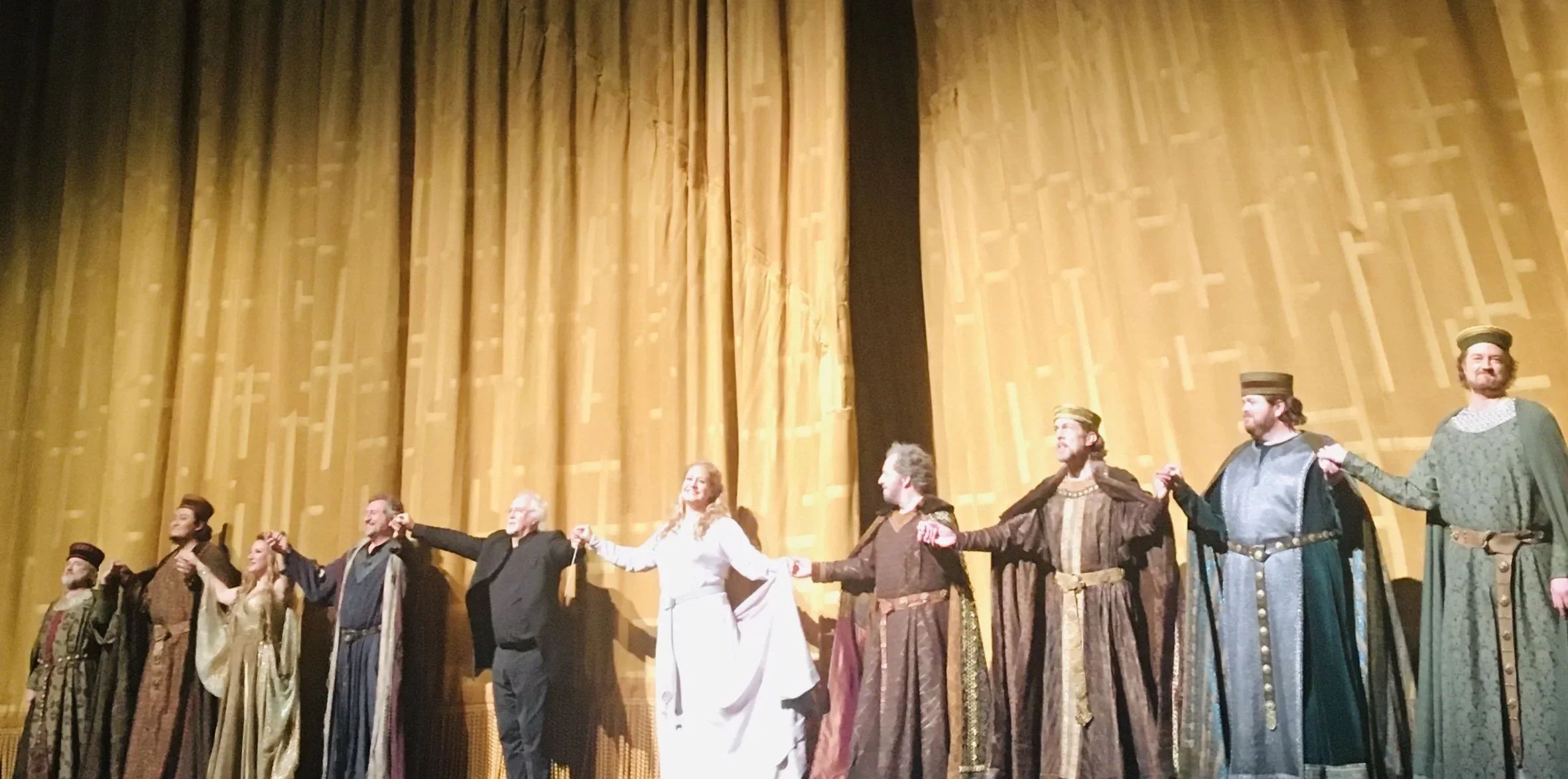Schenk's Tannhäuser, which premiered in 1977 at the Metropolitan Opera in December 2023, was a real song contest by all singers and related artists. They were polishing each other on each stage, relishing their roles, and the last one was memorable, especially the Pilgrims’ Chorus. Tannhauser is not religious teachings or confirmation of personal identity because I am not both Christian or German, but “Discover in Tannhäuser an emotional purgative or therapy – it powerfully exercises feelings of compassion.” Thanks to Joe Horowitz's review.
He mentioned Andrew Porter's review in 1977, “To do a Wagner opera in the way Wagner asked for it to be done.” also said, “Schenk Tannhäuser, proves just as presentable — and arguably more necessary — in 2023.”
He explained about Schenk's production, “Many points of conjunction between what the ear hears and the eye sees are unforgettably clinched. The action begins with the erotic Venusberg. Wagner asks for ‘a wide grotto which, as it curves towards the right in the background, seems to be prolonged till the eye loses it in the distance. From an opening in the rocks, through which the daylight filters dimly, a greenish waterfall plunges down the whole height of the grotto, foaming wildly over the rocks; out of the basin that receives the water a brook flows to the further background; it there forms into a lake, in which Naiads are seen bathing, while Sirens recline on its banks.” Schneider-Siemssen wisely doesn’t attempt all of this – but he poetically renders enough of it to get the job done. At the climax of the Venusberg orgy, Wagner makes everything suddenly and cataclysmically vanish, to be replaced by “a green valley. . . blue sky, bright sun. In the foreground is a shrine to the Virgin. A Shepherd Boy is blowing his pipe and singing.” A credulous rendering of this transformation, abetted by Wagner’s musical imagination, proves as breathtaking today as half a century ago.”
“The arts are vanishing from the American experience today. There is a crisis in cultural memory. How best to keep Tannhäuser alive? Flooded with neophytes, the Metropolitan Opera audience is very different from audiences just a few decades ago. What I observed at the end of Tannhäuser was an ambushed audience, thrilled and surprised. The Met is cultivating newcomers with new operas that aren’t very good. A more momentous long-term strategy, it seems to me, would be to present great operas staged in a manner that reinforces – rather than challenges or critiques or refreshes – the intended marriage of words and music. For newcomers to Wagner, an updated Tannhäuser would almost certainly possess less “relevance” than Schenk’s 46-year-old staging – if relevance is to be measured in terms of sheer visceral impact. ”
The leading artists were Andreas Schager, Tannhäuser, the passionate Wagner voice; "his artistry ran the gamut from joy to despair." Christian Gerhaher, Wolfram, "an elegant and intelligent lieder singer, his easy projection was a revelation, carrying the gentleness of his tone and impeccable articulation. Such a feeling of intimate connection to a voice is rare in this enormous building." Ekaterina Gubanova, Venus, "voluptuous sound was thrilling." Elza van den Heever, Elisabeth, " guileless faith with a light, shining tone and feathery vibrato - effortless projection. " Donald Runnicles, the conductor, "keeps an ideal pace, and the orchestra plays with a near-magical blend of color and warmth, full of details, glowing. "
After Gerhaher as Wolfram, sang "Abendstern" in the 3rd act, it was tranquillo, the serenity. I've never felt my heart empty at Met like that. Then the key changed, suggesting that Sharger Tannhauser's conflicts had arisen. He told the story about Rome. His serious Wagner singing was all coming into me because Gerhaher made me ready to observe Sharger's Wagnl art. In the one before the last performance, he was more emotional like Mime in Siegfried. The previous day's Van den Heever's openness! I felt her concentration from pianissimo to fortissimo. It was the extra glossy voice, really bravissimo. I saw her mouth open, and her jaw almost dropped, but such effortless innocence and operatic dynamics were naturally associated with her characteristics and the role. Gubanova as Venus mainly sings in 1st act. There is the famous aria, but I found her beauty in the latter when she sang with Schager, mid-long note, vibrato was more than Van den Heever has. I saw her 1st class mezzo vocal art.
Schager left his message on his SNS, “Being able to stand on stage in front of almost 4,000 enthusiastic visitors every time is something special. Here, people laugh, cry, and clap during the performance. I think that's great, and this energy reaches us on stage and inspires us. Art, which is so often declared dead, is alive, and what's more, it shows us a way in which coexistence among people can work. Art is about emotions and skill, and in the end, a huge amount of effort goes into making the audience happy and moving.“
This is his word from the heart, and we can see that the world's best musicians, audiences, and critics share a common awareness. It is a light for the people who are passionate about classical music.
Lastly, Met Choir's Pilgrims’ Chorus. The amount of voice replaced my all-good memory at Met in 20 years. It remains overwhelming.
2023年12月にメトロポリタン歌劇場で上演されたシェンク版『タンホイザー』(初演は1977年)は、出演者全員による真の歌の競演であった。歌手も関係者もそれぞれの舞台で互いを磨き合い、役に没頭し、最後の場面は特に印象的であった。とりわけ巡礼者の合唱は忘れがたいものである。筆者にとって『タンホイザー』は宗教的な教義や自己のアイデンティティの確認ではない(私はキリスト教徒でもドイツ人でもない)が、「『タンホイザー』には感情の浄化やセラピーとしての力があり、深い共感の感覚を強く喚起する」と感じられる。※この感想はジョー・ホロウィッツのレビュー(下記リンク参照)によるものである。
ホロウィッツは、1977年のアンドリュー・ポーターのレビューを引用している。「ワーグナーのオペラを、ワーグナーが求めた通りに上演すること。」さらに、「シェンク版『タンホイザー』は、2023年においても同様に上演可能であり、むしろその必要性は増している」と述べている。
シェンクの演出について、ホロウィッツは次のように説明している。「耳に聞こえるものと目に映るものとの結合点が数多く、忘れがたいほど見事に表現されている。物語は官能的なヴィーナスベルクから始まる。ワーグナーは、『右奥へ曲がる広い洞窟の奥行きは視覚上無限に続くかのように見える。岩の裂け目から差し込む淡い光を通して、緑がかった滝が洞窟の全高を流れ落ち、岩を泡立てながら勢いよく落下する。その滝壺から小川が奥へ流れ、やがて湖となり、水辺ではナイアードが入浴し、セイレーンが岸辺に横たわる』と描写している。」シュナイダー=シーメッセンはすべてを忠実に再現しようとはせず、しかし詩的に必要な部分を描き切ることで、演出を見事に成立させている。ヴィーナスベルクの頂点での饗宴では、ワーグナーの指示通り、突然すべてが消え去り、「緑の谷、青い空、明るい太陽が現れる。前景には聖母への祠があり、羊飼いの少年が笛を吹き歌っている」という場面に切り替わる。ワーグナーの音楽的想像力と相まったこの変化は、半世紀経った今でも息をのむほどである。
「今日のアメリカでは芸術体験は希薄になりつつある。文化的記憶の危機である。『タンホイザー』をどう生かすべきか?」新たな聴衆で溢れるメトロポリタン歌劇場は、数十年前の聴衆とは大きく異なる。私が観察したのは、『タンホイザー』の終盤、観客が驚きと感動で息をのむ瞬間であった。メトは新作オペラで新しい聴衆を育てているが、より長期的で重要な戦略は、優れたオペラを上演し、言葉と音楽の結合をの実現と考える。ワーグナー初心者にとって、現代風にアレンジされた『タンホイザー』よりも、シェンク46年前の演出の方が、純粋な感覚的インパクトという点で「生々しい実感」を与えるはずである。
主要な出演者は以下の通りである。アンドレアス・シャーガー(タンホイザー)は情熱的なワーグナー声を持ち、「喜びから絶望まで、芸術性の幅を全て表現した」。クリスティアン・ゲルハーヘル(ヴォルフラム)は「エレガントで知的なリーダー歌手であり、声の透明感と完璧な発音による自在な響きは、この巨大な劇場で声と親密に結びつく稀有な体験をもたらした」。エカテリーナ・グバノヴァ(ヴィーナス)は「官能的な響きで聴衆を魅了した」。エルザ・ヴァン・デン・ヒーヴァー(エリーザベト)は「無垢な信仰心を感じさせ、軽やかで輝く声、羽のようなビブラートを持ち、容易に音を響かせた」。指揮のドナルド・ランニクルズは「理想的なテンポを保ち、オーケストラは魔法のような色彩と温かさ、細部まで光り輝く演奏を披露した」。
第3幕でゲルハーヘルが「アーベントシュテルン」を歌った場面は静謐で心が穏やかになり、筆者はメトでこれほど心が空になる体験をしたことはなかった。その後、調が変わり、シャーガーのタンホイザーの葛藤を示唆する。彼はローマでの物語を語り、その真摯なワーグナー歌唱は、ゲルハーヘルの演奏によって心の準備が整えられた後に、より深く胸に響いた。最後から二回目の公演では、彼の表現は『ジークフリート』のミーメのように感情豊かであった。最終公演では、ヴァン・デン・ヒーヴァーのオープンな歌声が印象的であった。ピアニッシモからフォルティッシモまで、集中力と自然なオペラ的ダイナミクスを感じさせるその声は、まさにブラバであった。グバノヴァのヴィーナスは主に第1幕で歌うが、有名なアリアよりも、シャーガーと共演した際の中〜長音のビブラートで、その美しさが際立った。彼女のメゾ・ソプラノの技巧は一流である。
シャーガーは自身のSNSに、「ほぼ4,000人の熱心な観客の前に立てることは特別な体験である。ここでは観客が笑い、泣き、拍手を送る。そのエネルギーはステージにも伝わり、我々を鼓舞する。しばしば死んだと言われる芸術は、生きており、人々の共生の可能性を示している。芸術とは感情と技術であり、最終的には観客を感動させるために膨大な努力が注がれる」と記している。これは彼の心からの言葉であり、世界最高の音楽家、観客、評論家が共通の認識を持つ証左である。クラシック音楽に情熱を注ぐ人々にとって、希望の光である。
最後に、メト合唱団の巡礼者の合唱である。あの歌声の圧倒的な響きは、筆者が過去20年間にメトで体験した中で最高の記憶を塗り替えるほどであり、今もなお圧倒され続ける。
Tannhäuser
Saturday, December 23, 2023, 1:00–5:40PM
Beglückt darf nun dich, o Heimat, ich schauen -Tannhauser

